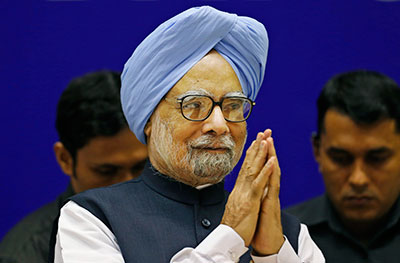This week, Indian Prime Minister Manmohan Singh marked his 80th birthday. He spent the day, Wednesday, in the company of family and at public events, according to news reports. “There are no celebrations. He prefers to be with his family in the morning–then work as usual,” Singh’s spokesman told the media.
Indeed, there isn’t much reason to celebrate. A man once credited for India’s emergence as an economic powerhouse is now mired in corruption scandals. His administration’s record on promoting press freedom has not fared well, either.
Since Singh took office in May 2004, eight journalists have been killed in India, according to CPJ research. Despite a vibrant media landscape, Singh’s government has done little to address impunity in attacks on the press. The world’s largest democracy ranked 12th in CPJ’s most recent annual impunity index, which calculates the number of unsolved journalist murders as a percentage of each country’s population.
Worse, this year, delegates from India, along with Pakistan and Brazil, took the lead in raising objections to a U.N. plan that would strengthen international efforts to combat deadly anti-press violence.
Also, in January 2011, police arrested journalist Sudhir Dhawale, who documented human rights violations for the Marathi-language monthly Vidrohi. He was charged with sedition and waging war against the state and was also charged under the draconian Unlawful Activities (Prevention) Act–a law that was strengthened under Singh’s administration.
Dhawale’s supporters say he was detained because he was a critic of a state-supported, anti-Maoist militia active in Chhattisgarh state, a center of the violence between Maoists and the state. Dhawale remains imprisoned, according to media reports.
More recently, cartoonist Aseem Trivedi was charged with sedition for his cartoons criticizing government corruption. If convicted, he could face life in prison.
We have also seen Singh’s government exercise stricter controls on expression. Google reported a sharp 49% rise in online content censorship in India between July and December 2011, compared with the previous six months. In its transparency report, Google said there were 101 requests for content removal by the government involving 255 items. In one request during the first half of last year, a local law enforcement agency requested that Google remove 236 communities and profiles that were critical of a local politician from the social networking site Orkut.
Last month, the government blocked access to around 300 websites, pages, and social media accounts–including the Twitter accounts of two journalists–in an effort to subdue communal violence in the turbulent northeast. Following the controversy, the Twitter hashtag #Emergency2012 became a top trending topic in India; it was coined in reference to a 21-month period in the 1970s known as the Emergency, when Prime Minister Indira Gandhi suspended elections and civil liberties.
Singh remains disturbingly sensitive to criticism. His office sent a sharp rejoinder to a Washington Post reporter who described him as “a dithering, ineffectual bureaucrat presiding over a deeply corrupt government.” The government also blocked several spoof Twitter accounts imitating Singh earlier this year, according to Reuters. Singh’s own Twitter account was noted by the BBC for its “dull entries.”
Singh, the only prime minister who has returned to power after completing a five-year term since Jawaharlal Nehru, was largely credited for India’s rapid growth when he served as finance minister in the early 90s. Many argue his economic reforms helped make India one of the leading emerging economies. Further, he broke barriers when he became the first Sikh to win office in the Hindu-majority country.
But his administration was accused of unethically awarding contracts for the 2010 Commonwealth Games in New Delhi. The administration was then rocked by a scandal involving mobile phone bandwidth, which auditors say cost the country billions in lost revenue. Last year, a cable revealed by Wikileaks suggested that the government bribed members of parliament for their vote on the controversial 2008 nuclear deal between India and the U.S.
And more recently the government was accused of awarding coal mining contracts to companies without competitive bidding, costing the government billions in revenue. Singh denied these allegations.
Singh’s term is not set to end until 2014. In the time that remains, he has the opportunity to help make India not just the largest democracy but a leading one. (He could begin by seeing to it that India’s colonial-era sedition law is revised). Whether Singh advances press freedom in India will surely affect the legacy he leaves behind.
UPDATE: This blog has been modified to reflect that Singh’s birthday was Wednesday, not Tuesday.
